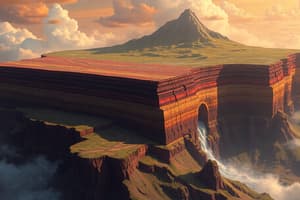Podcast
Questions and Answers
What process involves the breaking down of rocks by chemical or physical means?
What process involves the breaking down of rocks by chemical or physical means?
- Convection
- Erosion
- Weathering (correct)
- Deposition
Which layer of Earth is known to become denser as you go deeper?
Which layer of Earth is known to become denser as you go deeper?
- Crust
- Mantle (correct)
- Outer Core
- All of the above
Which type of boundary is characterized by two tectonic plates sliding against each other?
Which type of boundary is characterized by two tectonic plates sliding against each other?
- Static boundary
- Divergent boundary
- Convergent boundary
- Transform boundary (correct)
What occurs when sediment particles are moved to a new location?
What occurs when sediment particles are moved to a new location?
What type of rock is formed mainly from cooled magma?
What type of rock is formed mainly from cooled magma?
What is the law of superposition used to determine?
What is the law of superposition used to determine?
What significant environmental impact is caused by human urbanization?
What significant environmental impact is caused by human urbanization?
Which of the following statements about electromagnetic waves is correct?
Which of the following statements about electromagnetic waves is correct?
What is the primary reason for the movement of tectonic plates?
What is the primary reason for the movement of tectonic plates?
Which of the following correctly describes the characteristics of sedimentary rocks?
Which of the following correctly describes the characteristics of sedimentary rocks?
Which human activity has been linked to the process of desertification?
Which human activity has been linked to the process of desertification?
What type of boundary is responsible for creating sea trenches?
What type of boundary is responsible for creating sea trenches?
Which of the following best describes the role of weathering in the rock cycle?
Which of the following best describes the role of weathering in the rock cycle?
Which property of electromagnetic waves is defined as the height of the wave from its midpoint?
Which property of electromagnetic waves is defined as the height of the wave from its midpoint?
What causes erosion in the context of earth science?
What causes erosion in the context of earth science?
Which geological process is most directly associated with the formation of mountains?
Which geological process is most directly associated with the formation of mountains?
Flashcards
Layers of Earth
Layers of Earth
Different sections of the Earth, like the mantle and core, that get progressively denser.
Convection Currents
Convection Currents
Heat moving within the mantle, causing the tectonic plates to move.
Types of Rocks
Types of Rocks
Metamorphic (pressure), Sedimentary (layers/superposition, newest on top), Igneous (heat/magma).
Law of Superposition
Law of Superposition
Signup and view all the flashcards
Plate Tectonics
Plate Tectonics
Signup and view all the flashcards
Plate Boundaries
Plate Boundaries
Signup and view all the flashcards
Weathering
Weathering
Signup and view all the flashcards
Human Impact (Environment)
Human Impact (Environment)
Signup and view all the flashcards
Earth's Inner Layers
Earth's Inner Layers
Signup and view all the flashcards
Tectonic Plate Movement
Tectonic Plate Movement
Signup and view all the flashcards
Types of Rock Formation
Types of Rock Formation
Signup and view all the flashcards
What are Transform Boundaries?
What are Transform Boundaries?
Signup and view all the flashcards
Divergent Boundaries
Divergent Boundaries
Signup and view all the flashcards
Convergent Boundaries
Convergent Boundaries
Signup and view all the flashcards
Sea Trenches & Igneous Rock
Sea Trenches & Igneous Rock
Signup and view all the flashcards
Study Notes
Earth's Layers and Rock Recycling
- Earth's layers (mantle, core) become denser inward
- Tectonic plates move due to convection currents in the mantle
- Three rock types: metamorphic (pressure), sedimentary (layers), igneous (cooled magma)
- Law of superposition: newer rocks are on top of older rocks in sedimentary layers
Weathering, Erosion, and Deposition
- Weathering: breaking down rocks (chemical or physical)
- Erosion: moving rocks and sediment
- Deposition: sediment settling in a new location
Plate Tectonics
- Plate tectonics: theory of moving plates over time
- Supported by fossil evidence
- Types of plate boundaries:
- Transform: plates slide past each other (earthquakes)
- Convergent: plates move together (mountains/volcanoes)
- Divergent: plates move apart (sea trenches)
- Igneous rock commonly forms in these areas.
Law of Superposition
- Used for relative dating of rocks
- Younger sedimentary rocks are on top of older ones
Human Impact
- Greenhouse effect: natural process trapping heat
- Human impact on natural environment:
- Urbanization (destroys ecosystems)
- Soil erosion
- Desertification (fertile land into desert)
- Ocean acidification
Electromagnetic Waves
- Electromagnetic waves have both wavelength and amplitude
- Order of speeds of waves: Vacuum > Air > Liquid > Solid (for light waves)
- Sound travels fastest in solids
- Light wavelengths (longest to shortest): Radio, Microwave, Infrared, Visible, Ultraviolet, X-Ray, Gamma
Refraction and Reflection
- Refraction: light bends when passing through different mediums (can create illusions)
- Reflection: light bounces off a surface
- A color is reflected depending on the object (if all reflected : white, if no color: black)
Energy and Heat
- Energy: the ability to do work (potential and kinetic)
- Heat: transfer of energy from hot to cold (until thermal equilibrium)
Studying That Suits You
Use AI to generate personalized quizzes and flashcards to suit your learning preferences.
Related Documents
Description
Test your knowledge on Earth's layers, rock types, and the processes of weathering, erosion, and deposition. This quiz covers key concepts such as plate tectonics and the law of superposition, providing a comprehensive look at geological processes. Perfect for students studying geology or earth sciences.




